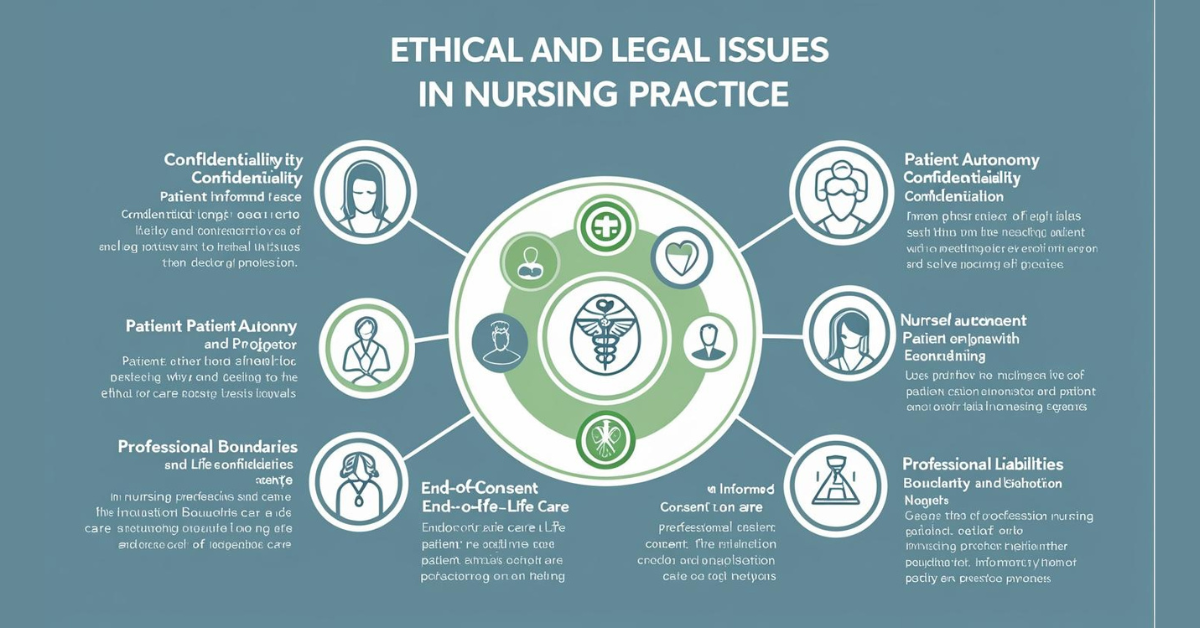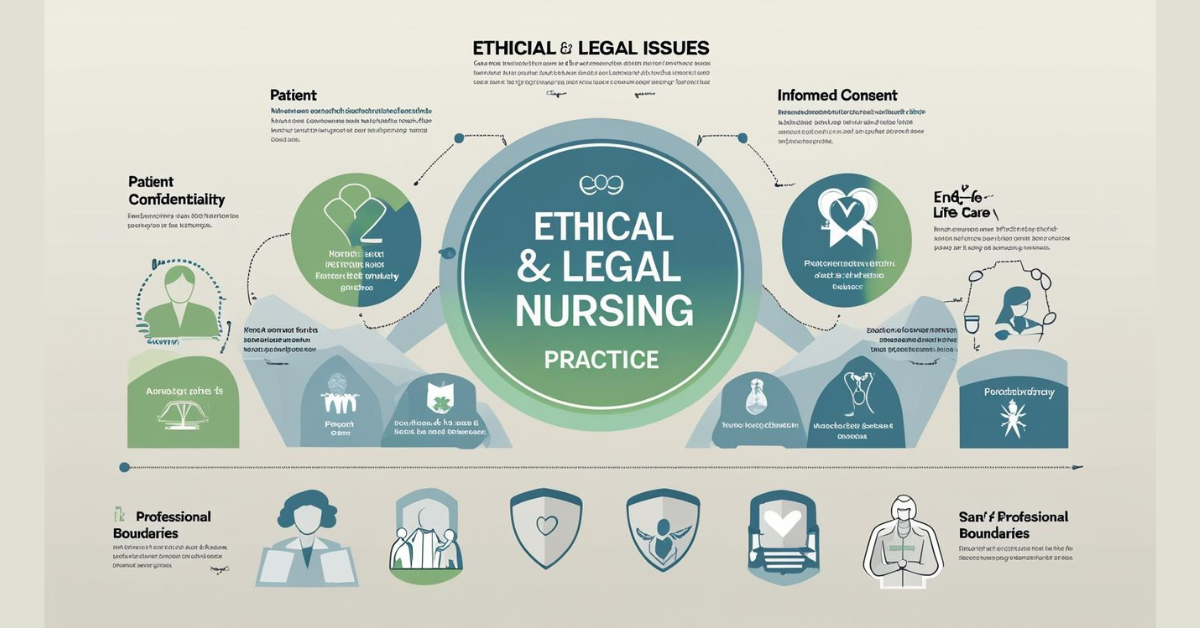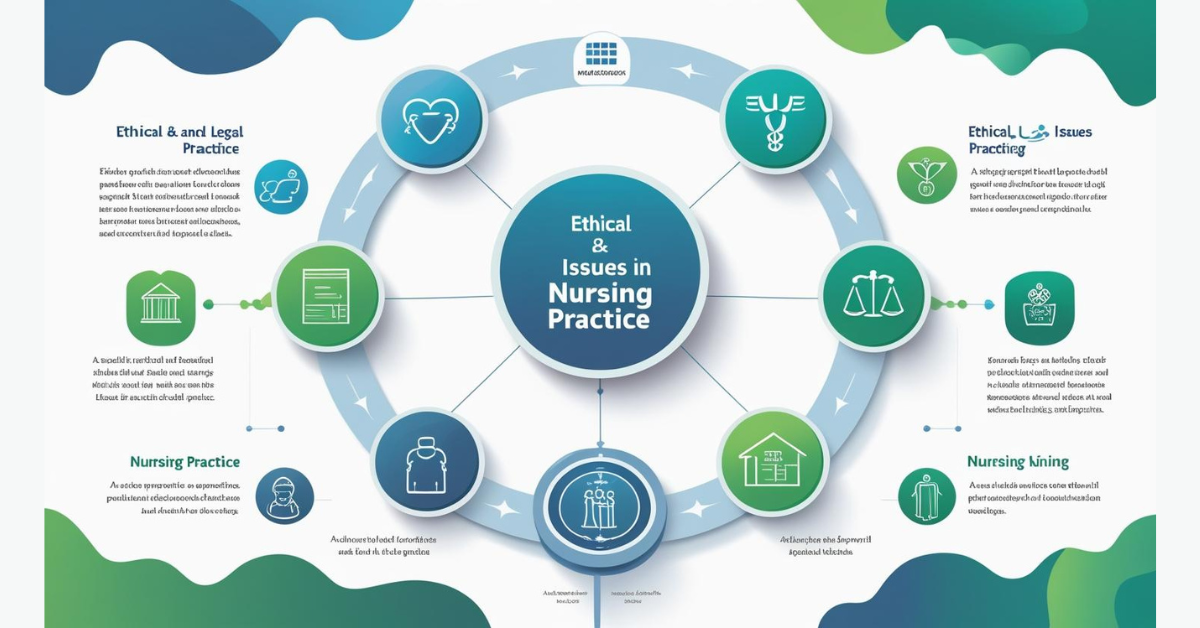What are Ethical And Legal Issues In Nursing Practice. An ethical problem in nursing arises when the nurse must choose between two “correct” but conflicting values: their own values and the values of other parties (the patient, their family, other healthcare professionals, or a combination of both).
The Ethical And Legal Issues In Nursing Practice
“Legal and ethical issues” refer to the complex challenges and laws surrounding human rights, intellectual property, censorship, control, access, data protection, and professional responsibility in the context of the production, collection, classification, access, and dissemination of information.
Ethical standards are based on human rights and human error, while legal standards are strictly based on the law. It is perfectly possible for an action to be legal but not ethical. Nurses advocate for patients and must strike a balance in patient care. There are four fundamental principles of ethics: autonomy, beneficence, justice, and non-maleficence.
Professional ethics encompasses guidelines and principles, which are distinct from rules and regulations. Failure to comply with laws and professional ethics can lead to sanctions and other consequences. Laws are legally binding, while codes of ethics are intended to be professionally binding. Examples of common overlaps between legal and ethical duties include the duty not to incur grievances, to fulfill contracts, and (in certain cases) not to discriminate, etc. There is a significant overlap between law and ethics.
Discrimination and harassment raise significant ethical issues for human resource professionals and managers and have serious implications for a company’s finances and reputation. In many countries, anti-discrimination laws seek to protect workers from this unfair treatment. Three basic principles, widely recognized in our cultural tradition, are particularly relevant to the ethics of research involving human subjects: the principles of respect for persons, beneficence, and justice.
What are Ethical And Legal Issues
Some issues nurse leaders and managers face may be viewed from both an ethical and a legal perspective. In these cases, nurse leaders and managers must have a good understanding of the ethical principles that guide nursing practice as well as the laws and regulations that govern health care, nursing practice, and employment.
The Advance Directives
According to ANA Code of Ethics for Nurses, nurses have an obligation to be knowledgeable about the moral and legal rights of their patients regarding self-determination (ANA, 2015a). The PDSA, discussed earlier, mandates that all patients have the opportunity to initiate an advance directive, which is a document that provides information about a person’s desires should he or she become unable to make health-care decisions.
In other words, an advance directive pro vides directions to family and health-care professionals by a person in advance of becoming ill and incapacitated. Nurses and other health-care professionals have an ethical and legal duty to respect a patient’s advance directive. Nurses can be held liable for violating a patient’s advance directive and could be charged with battery and malpractice. A nurse’s responsibilities related to advance directives include the following:
- Initiating discussion with a patient about advance directives
- Providing a patient with written information about advance directives
- Communicating the presence of an advance directive to all members of the health-care team
- Ensuring that advance directives are current and accurately reflect the patient’s wishes
Establishing an advance directive or having discussions with families about life sustaining care can reduce the burden of decision making for loved ones (Hickman & Pinto, 2013). In addition, advance directives can assist with the delivery of patient-centered care. (See Exploring the Evidence 4-3.) There are three types of advance directives:
- A living will
- A do not resuscitate (DNR) order
- A durable power of attorney for health care
Living Will
A living will is a legal document that details a person’s wishes regarding health care treatments and procedures in the event the person becomes incapacitated and is facing end of life. Living wills are legal in all states, but elements or what is allowed may vary. Nurses must be familiar with the statutes related to living wills in the state and organization in which they practice.
Do Not Resuscitate
A DNR order indicates the life-sustaining measures that should be withheld in the event of impending death. In some instances, an allow natural death (AND) order is initiated, which means that only comfort measures will be provided.
As patient advocates, nurses play an active role in initiating discussions about DNR and AND orders with patients, families, and members of the health-care team (ANA, 2012). Nurses “actively participate in assuring the responsible and appropriate use of interventions to optimize the health and well-being of those in their care. This includes acting to minimize unwarranted, unwanted, or unnecessary medical treatment and patient suffering” (ANA, 2015a, p. 2).
Durable Power of Attorney for Health Care
A durable power of attorney for health care is a legal document that identifies a health-care surrogate. The surrogate is a person designated to make health-care decisions for another person, who is incapacitated. The health-care surrogate should have a clear understanding of the person’s wishes regarding health care and be willing to respect those wishes even if he or she does not agree. By participating in discussions with surrogates, providing guidance and referrals, and identifying problems in the decision-making process, nurses will support patient self-determination (ANA, 2015a).
Nurse leaders and managers must ensure that policies and procedures support the appropriate use of interventions to minimize patient suffering and optimize end-of-life nursing care.
Confidentiality and Information Security
Every patient has an ethical and legal right to privacy and confidentiality. Nurses are bound by their code of ethics to respect patients’ privacy and confidentiality, which includes ensuring patient information is secure at all times. The HIPAA, discussed earlier in this topic, requires that nurses protect all verbal and written communication about patients, including medical records, electronic records, and verbal exchange of patient information such as patient teaching and change-of-shift report.
The HIPAA requires health-care agencies to monitor staff adherence to related policies and procedures, computer privacy, and data security. Nurses must be aware of institutional policies and procedures related to patient privacy and confidentiality. A new area of concern internationally is the use of social media and other electronic communication. Although social networks such as Facebook, Twitter, Snapchat, Instagram, YouTube, and LinkedIn offer opportunities for knowledge exchange and dissemination among local, national, and global communities, they also pose substantial risks.
All nurses have an obligation to understand the nature, benefits, and consequences of participating in social networking (ANA, 2011). Misusing social media can have severe consequences, such as disciplinary action by state boards of nursing that range from cautionary letters to licensure suspension. Violation of federal and state laws can result in civil or criminal penalties including fines and imprisonment (Spector & Kappel, 2012).
Nurses can also face liability for defamation, invasion of privacy, and harassment, depending on the type of postings and social media (NCSBN, 2011c). Nurse leaders and managers are obligated to enforce organizational policies and procedures related to social media and networking and to address any breach of confidentiality and privacy immediately. As long as nurses remain aware of their professional obligations, using social networking will not be an issue.
Read More:
https://nurseseducator.com/didactic-and-dialectic-teaching-rationale-for-team-based-learning/
https://nurseseducator.com/high-fidelity-simulation-use-in-nursing-education/
First NCLEX Exam Center In Pakistan From Lahore (Mall of Lahore) to the Global Nursing
Categories of Journals: W, X, Y and Z Category Journal In Nursing Education
AI in Healthcare Content Creation: A Double-Edged Sword and Scary
Social Links:
https://www.facebook.com/nurseseducator/
https://www.instagram.com/nurseseducator/
https://www.pinterest.com/NursesEducator/
https://www.linkedin.com/in/nurseseducator/
https://www.researchgate.net/profile/Afza-Lal-Din
https://scholar.google.com/citations?hl=en&user=F0XY9vQAAAAJ



F*ckin’ amazing things here. I am very glad to see your post. Thanks a lot and i am looking forward to contact you. Will you please drop me a e-mail?
Hi there very cool website!! Guy .. Beautiful .. Superb .. I’ll bookmark your site and take the feeds also…I am happy to seek out numerous helpful info right here in the publish, we want develop more strategies on this regard, thanks for sharing. . . . . .